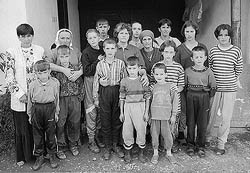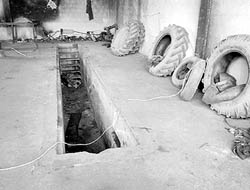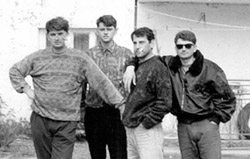
|
The Dobraj
family in Zahac lost their husbands and fathers in the May 14th Serb militia attack.
They were attacked again on June 10 by the Markovic brothers, who killed a disabled
brother, two women and a girl.
(Photo:
Stephen Smith)
|
The women of the Dobraj family endured the anguish of two massacres. Three of their husbands - Fazil, Muhamet and Halit - were executed when Serbian militia and security forces attacked Zahac on May 14th . The attack came only hours after dozens of men were killed in nearby Cuska and Pavlan. A month later, a militia gang returned for another spasm of violence.
The unarmed Dobraj men were in their 30's and early 40's. According to war crime investigators and a lone survivor of the killings, there were 15 ethnic Albanian men herded into the mechanic's trench of an auto repair shop. There, the survivor said, they waited with heads bowed for an unbearable length of time, uncertain what would happen. Finally, a car arrived, someone got out, and the men were shot one-by-one in the head.

|
14 men
from Zahac were lined up in this mechanic's pit and executed, according to a lone
survivor, by gunshots to the head. The survivor fainted and was covered by other
bodies.
(Photo:
Stephen Smith)
|
The May 14th massacre left three widows and nine fatherless children to fend for themselves.* The Dobraj family spent much of that time locked behind the high walls of their traditional Albanian family compound. Then a month later, on June 10th, they saw a yellow Mercedes pull up outside. Four men got out wearing camouflage and carrying automatic weapons. The family recognized them as Serbs from the village of Naklles, just across the highway. The widows said three of them were brothers named Markovic; they ran a kiosk in Naklles. None of the armed men was wearing a mask.
According to one of the widows, a partially paralyzed 44-year-old brother who was staying with the families, Haxi Dobraj, stood up to the Serbs at the entranceway to the compound. He was shot in the head at close range, his blood splattering laundry drying on the clothesline nearby.
The Markovics forced the women, children and their grandmother into the living room of one of the houses, where the militiamen demanded money. "Our five year-old-girl was crying hysterically and wanted to escape from the room," a witness said, "but the paramilitary wouldn't let her."

|
Mica and Laza Markovic (first and second from left) and Sasa Markovic, right. The other man's name is not known.
|
At some point, according to the witnesses, Ljuljeta Kastrati exchanged words with the men. The 24-year-old woman lived just across the road with her parents. Sasa Markovic shot Kastrati in the arm. When she cried out for her mother, Markovic shot her in the head, killing her. Her mother watched the execution.
The family identified Sasa Markovic, and his bothers Mica and Laza, from a photo shown to them by a reporter. The men's identity was confirmed independently by a local gas station owner who also knew the brothers. The whereabouts of the Markovics is unknown.
"(Sasa) took all our valuables and shot me and Xhevriji in the leg," said one of the women. Though the woman recovered, her 13-year-old niece, Xhevriji Shala, died the next day from her wound. Xhevriji's sobbing mother brought out a framed picture of Xhevriji and held her daughter's blood-stained pajamas as the story was told.
Before leaving, according to the women, Sasa Markovic grabbed Ljuleta Kastrati's mother, 50-year-old Ajshe, by the hair and forced her across the road to her house, perhaps to look for more valuables. Gunshots crackled and Ajshe was later found dead. Her 60-year-old husband heard the killing from his hiding place in the garden.
Several months later, the widows of Zahac cope the best they can in an uncertain post-war economy with no husbands, and with a brood of traumatized children. The oldest male is 13, in this traditionally patriarchal culture.
Sitting on a stool in the center of her family is the aging grandmother, wearing a cable-knit sweater and a wool head scarf. "Four of her sons were killed and her grandchildren have no father," one of the women says with a sad shake of her head. "Now she doesn't have anybody but us."
* First names of the witnesses are withheld to protect their safety.
|

